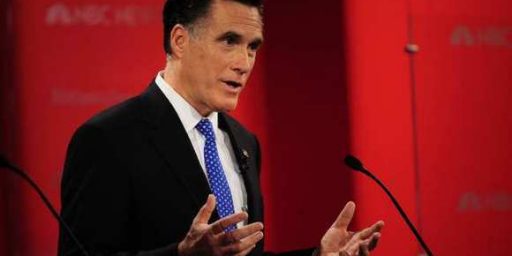Blue State Tax Breaks?
Some Democrats who support ending the Bush tax cuts for high earners want to exempt their own rich constituents.
The WSJ editorial board has stoked some flames with “The Blue State Blues – Taxing the rich, except in my district.” They note that, while Democrats want to repeal the Bush tax cuts, at least on higher earners, some want to exempt their own constituents.
New York Representative Jerrold Nadler, who wants to exempt his own six-figure constituents from the tax hike he supports. Mr. Nadler’s bill would “require the IRS to adjust tax brackets proportionally in regions where the average cost of living is higher than the national average.”
In other words, the various tax brackets would apply to residents in certain regions at higher income levels versus other parts of the country. A family with an income of $50,000 or even $1 million in Manhattan would pay less federal income tax than a family with the same earnings in Omaha. The bill is called the Tax Equity Act, but a more accurate title would be the Blue State Tax Preference Act.
“The basic costs of life in the New York region are much steeper than in most parts the country,” says Mr. Nadler. “The reality is that a dollar in New York isn’t worth nearly as much as a dollar in Spokane or Knoxville or Topeka. It’s time for our tax code to take reality into account when assessing someone’s tax liability.”
That point about “reality” and the tax code could certainly use some fleshing out, but leave that aside. A big reason the cost of living is so high in Boston, Manhattan and San Francisco is because of high state and local taxes, union work rules, and heavy business regulation that make it more expensive to produce, sell and buy things.
Why should someone in Spokane or Knoxville or Topeka be penalized because New York and California impose destructive policies? Mr. Nadler also conveniently forgets that the federal tax code already subsidizes high-cost states through the deductibility of state and local income and property taxes.
An all-star line-up of liberal class warriors has nonetheless endorsed Mr. Nadler’s effort to raise taxes on the rich everywhere but in their own districts. New York House Members Tim Bishop, Steve Israel, Nita Lowey, Carolyn Maloney and Carolyn McCarthy are cosponsors. Ms. Lowey, who has voted to tax anything that moves, now says that “When it comes to the tax code, one size just doesn’t fit all” and laments that New York has “some of the highest property taxes in the country.” But whose fault is that?
So welcome to the brave new world of “tax equity.” If you live in a state that voted for Barack Obama, you get a tax cut.
That’s a great line. And, overall, the editorialists have a point. You can’t simultaneously argue that those who earn over $100,000 are “rich” and argue that it depends on where you live. And there’s no doubt that the policies pursued in blue states and major urban centers contribute to the high cost of living.
On the other hand, Nadler is of course right that it’s more expensive to live in Manhattan than in Topeka. And it’s not just because of high taxes and regulation but because of the laws of supply and demand. A lot of people want to live in Manhattan, close to its jobs, restaurants, culture, nightlife, and whatnot, and it’s very small. So, a 600 square foot loft goes for more than a three bedroom house out in the middle of nowhere.
Should government policy reflect this fact? It already does. For example, federal employees living in high cost of living areas get paid a substantial bonus to offset these costs. And, as noted in the editorial, they also get the tax write-offs for certain things that are subsidized in our system.
Furthermore, the fact of the matter is that, generally speaking, the blue states and the big cities subsidize the red states and the rural areas, not vice versa. It’s been that way for as long as I can remember.
If we’re going to have an income tax — and we are — and it’s going to be graduated by income — and it is — then it probably makes some sense to include some sort of regional adjustment. (Full disclosure: I’d personally benefit from doing this, living as I do in the DC suburbs.)
Realistically, though, it’s not going to happen.
First, the plight of high earners living in expensive cities does not tug at the hearts and souls of most Americans. You’d just never get anything like this through the House, much less the Senate.
Second, high earners living in expensive cities is an almost perfect overlap with high earners. Aside from the odd Warren Buffett and Sam Walton, the money congregates around big cities. Indeed, it’s almost definitionally true since low earners can’t afford to live there.
Hat tip: Warner Todd Huston







I’m sympathetic to the argument being made here, but the problems raised here are more than enough to turn me away from it as policy. There is, however, another objection that I think merits due consideration.
If such a measure is passed, it’s going to open yet another income tax loophole for rich people. What is there to stop rich people from moving into even tighter self-segregated communities in order to artificially create areas with a “higher cost of living?” This requires a bit more community coordination than current tax avoidance schemes, but it’s completely doable – especially for people who already have the kind of organizational skills typically associated with high incomes in a modern economy.
You note that “high earners living in expensive cities is an almost perfect overlap with high earners.” It will be even moreso if measures like this ever become reality.
I can’t help but consider that it’s easier for high earners to move to a low(er) tax location than for low earners to move to some location that might provide them with better earning opportunities.
This makes me, let’s say, unsympathetic.
What does this mean as a practical matter, discrimination between states, representative districts, MSAs, census tracts? It seems to me the larger the unit, the less precise the cost of living adjustments would be. The smaller the unit, the easier for participants to play the system.
but just having a higher cost of living in a city doesnt necessarily mean your dollar doesnt go as far. There is a reason why people live in these high cost areas – because you get more out of it. They may have to pay more for basic necessities but on net they are purchasing the ability to live in a city with all of its ammenities. On my salary i would be loaded if I moved to rural West Virginia, but I wouldnt get as much value out of doing so. Is my standard of living therefore lower by currently living in a high cost urban area?
I believe the term “screw you” comes to mind. Overlapping the high cost cities and higher earners is voting Dem. You voted in the tax and spend morons you own them, you pay for it. This was mentioned in the article and is a major component of why the costs are so high in places like New York. You can’t vote for people who promise to spend as much as possible on any and every social program and then bitch about your taxes. You also can’t vote for those same morons and expect the people who didn’t vote for them to carry more load for you. If he wants to help his constituents maybe he should do what the republicans wanted to do, repeal the AMT, but now that it hurts the dems who have owned it for the last 30 or so years you can’t blame the republicans for wanting to let them suffer with it for a while as it is hard for dems to explain how they are for protecting the “little people” as they continue the program to tax the daylights out of them. mpw
i think it would make some sense to expand safety net programs so to reflect cost of living in urban areas (30k in rural Alabama is going to go a heck of a lot further than 30k in New York City), but I am not sure I want to see the tax code reflect this.
The reality is if you don’t like how much it costs to live somewhere then move. I think changing the tax code to reflect high cost of living would end up with an even more convoluted tax code, and how often does the IRS revamp the tax code. While it is generally cheaper to live in some southern states, several of the cities end up with a fairly high cost of living as well-so just how detailed does this cost of living exemption on taxes go?
I am in favor of simplifying the tax code not making it even more convoluted.
You know what they need. A tax deduction for the cost of travel to their yacht moored in a more tax friendly location. That would equalize things.
Of course the only way this gets enacted is if the rich spread out enough to own their own congressperson.
So what this is saying is that Democrats get that they can’t get elected either without the cash that comes from wealthy individuals and businesses. OK, and rain is wet.